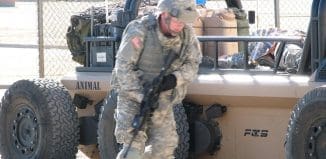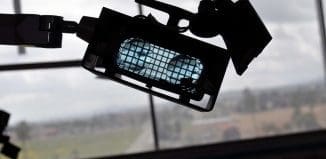The Libyan Defense Market Lures U.S. Companies
This post is also available in:  עברית (Hebrew)
עברית (Hebrew)
The Libyan government wants U.S. made military hardware.

Libya is becoming a prime market for U.S. contractors as a country rich in natural resources and with limited military equipment, it is reaching out to companies in a bid to attract them to a nation that is still taboo to many U.S. politicians.
Speaking at an American Chamber of Commerce in a Libyan event in Washington D.C. on Oct. 3, Col. Ibrahim El Fortia, the Lybian Embassie’s defense attaché , said the country wants to work with American companies, partially because of the U.S. role in helping to topple the Gadhafi regime.
“We would like to see priority go to the American companies,” El Fortia, speaking through a translator, told the audience at the event hosted by the Patton Boggs law firm. “I was a deputy defense minister in 2011. There were a lot of defense companies coming from all over the world giving their offers to the Libyan government and the defense ministry. We were sorry not to see the American companies coming at that time.”
Some companies, particularly those based in Europe, have been aggressive on the Libyan market, but U.S. companies are not only navigating complex laws but also an ongoing stigma due to the Sept. 11, 2012, attack on the U.S. consulate in Benghazi that left four Americans, including the embassador J. Christopher Stevens, dead.
According to Defense News, thus far the market opportunity has been pretty small. There have been 15 letters of request from the Libyan government for foreign military sales. Those have led to a deal for 287 AM General Humvees, with 24 shipped and 30 due by the end of the month, the rest are due by the end of 2014. Lockheed Martin C-130 cargo planes and Boeing CH-47 helicopters have also been discussed. There was discussion of a deal for fast-response cutters that fell through as well.
iHLS – Israel Homeland Security
Right now the U.S. is offering only limited financial support, in the form of $1 million in foreign military financing and $15 million from the joint State Department/DoD Global Security Contingency fund.
“One of the questions from a congressional standpoint is how much is available from [foreign military financing],” said Mary Beth Long, CEO of Askari Defense and former assistant secretary of defense. “There is the sentiment on the Hill that, post-conflict, Libya has such tremendous natural resources, mostly its talented people, but also access to gas and oil, that there will be very few funds from the U.S. government programs.”
Part of the reason for the limited sales has been general government reticence to sell equipment to an unstable government. Defense News previously reported on disagreements between the Defense and State departments on deals with the country.
But that environment has changed, a defense official said. “As a whole, the inner agency is very supportive of U.S. companies doing business in Libya,” the official said. “I won’t say the same for our Congress as a whole. There are definitely reservations, and most of those reservations in my opinion are tied to Benghazi and the incident that happened last year. That tends to come up as we try to do congressional notifications, and it may be completely unrelated to what we’re doing.”
The pace of sales may soon pick up. The U.S. is helping to train 10,000 Libyans for the military at a cost of about $600 million over eight years. “Something we haven’t looked at is that we’re going to have all these troops, and at the end, where are these troops going to go, and what equipment and what facilities will they use?” the official said.
In particular, Libya is looking for help in securing its border. Representatives from most major defense companies attending the conference, and nearly every executive, mentioned border security offerings.
“It is true that we can say that Libya is not in control of its borders,” El Fortia said. “The security of the Libyan border is one of our top priorities. Libya has very, very long borders. Our borders are open.”






























